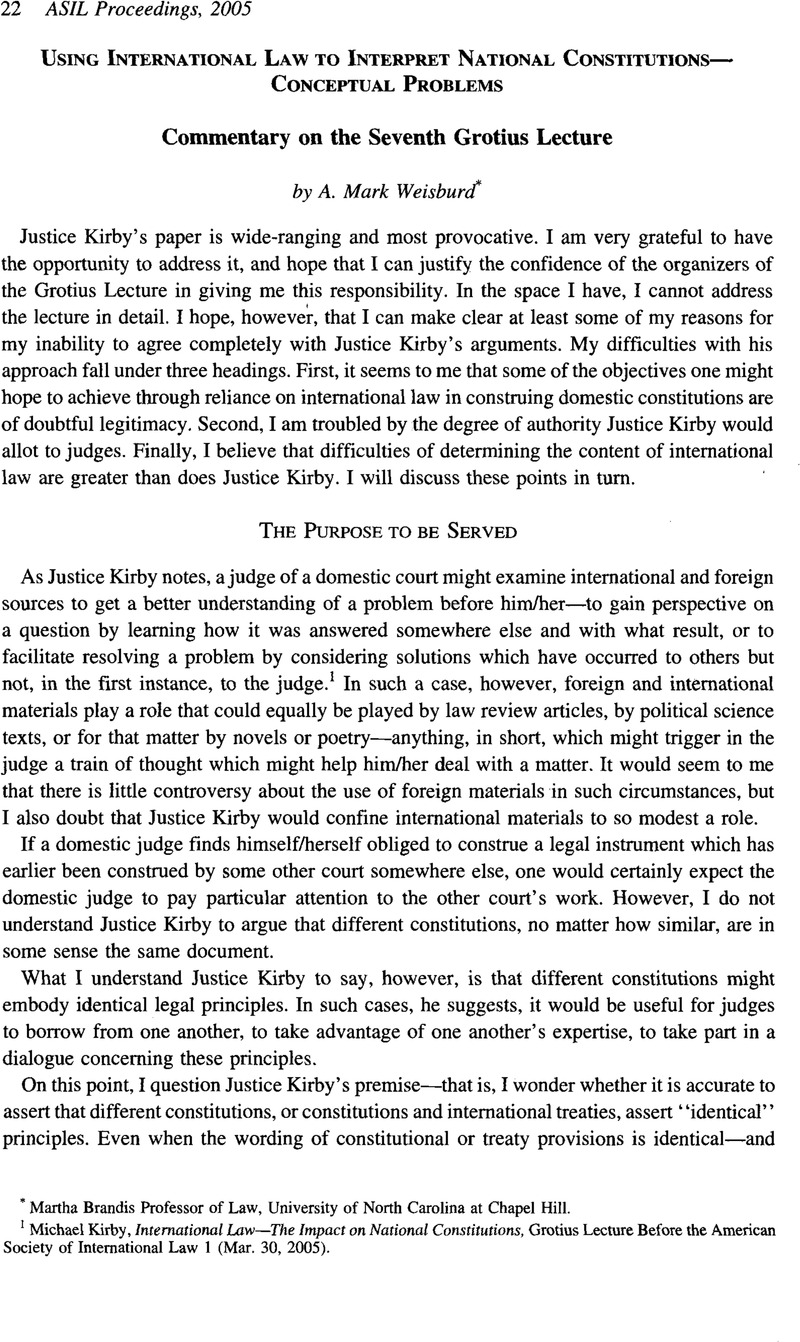No CrossRef data available.
Published online by Cambridge University Press: 28 February 2017

1 Kirby,, Michael International Law—The Impact on National Constitutions, GrotiusLecture Before the American Society of International Law 1 (Mar. 30, 2005).Google Scholar
2 Compare U.S. Const, amend. I (“A Congress shall make no law ... abridging the freedom of speech ... ” ) with
1. Everyone shall have the right to hold opinions without interference.
2. Everyone shall have the right to freedom of expression; this right shall include freedom to seek, receive and impart information and ideas of all kinds, regardless of frontiers, either orally, in writing or in print, in the form of art, or through any other media of his choice.
3. The exercise of the rights provided for in paragraph 2 of this article carries with it special duties and responsibilities. It may therefore be subject to certain restrictions, but these shall only be such as are provided by law and are necessary: (a) For respect of the rights or reputations of others; (b) For the protection of national security or of public order (ordre public), or of public health or morals. International Covenant on Civil and Political Rights, art. 19, Dec. 16,1966,999 U.N.T.S. 171, 178,6ILM 368,374.
3 Schauer,, Frederick The Exceptional First Amendment (Feb. 15, 2005) available at Social Science Research Network, http://papers.ssm.com/sol3/papers.cfm?abstract_id=668543.Google Scholar
4 Id. at 1-19.
5 Id. at 22-27.
6 Richburg,, Keith B. Swedish Hate-Speech Verdict Reversed; Sermon condemning Homosexuals Rules Not Covered by Law, Wash. Post, Feb. 12, 2005, at A16.Google Scholar
7 Anderson,, Kenneth Squaring the Circle? Reconciling Sovereignty and Global Governance Through Global Government Networks 118 Harv . L. Rev. 1255 (reviewing Anne–Marie Slaughter, ANew World Order(2004)).Google Scholar
8 Kirby, supra note 1, at 1.
9 Black & White Taxicab & Transfer Co. v. Brown & Yellow Taxicab & Transfer Co., 276 U.S. 518, 533 (1928) (Holmes, J., dissenting).
10 Southern Pac. Co. v. Jensen, 244 U.S. 205, 222 (1917) (Holmes, J., dissenting).
11 304 U.S. 68 (1938).
12 Kirby, supra note 1, at 1.
13 Jed Rubenfeld, The Two World Orders, W ilson Q., Autumn 2003, at 22, 30; see also id. at 26-28.
14 Id. at 29.
15 Id. at 30.
16 Kirby, supra note 1, at 1.
17 Id. at 1.
18 Id. at 1.
19 Id. at 1.
20 60 U.S. 393 (1851).
21 408 U.S. 238 (1972).
22 428 U.S. 153, 179-182 (1976) (opinion of Stewart, Powell, and Stevens, JJ.).
23 410 U.S. 113 (1973).
24 Rubenfeld, supra note 13, at 28 (emphasis added).
25 Kirby, supra note 1, at 1.
26 Id. at 1.
27 Id. at 1.
28 Id. at 1.
29 Id. at 1.
30 Kelly, J. Patrick , The Twilight of Customary International Law, 40 V a . J. Intl. L. 449, 478 (2000).Google Scholar
31 United States v. Yousef, 327 F.3d 56, 102-03 (2d. Cir. 2003) (footnotes omitted).